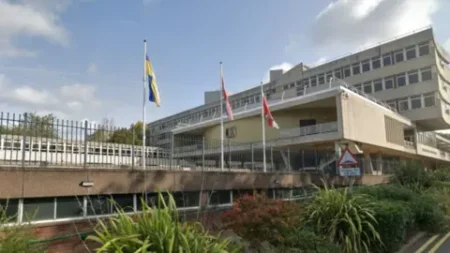In a recent controversy within Warwickshire County Council, it was revealed that the Pride flag, specifically the Progress Pride flag, was flown without the necessary permissions. This situation raised significant questions concerning the authority’s protocols and governance. The issue was brought to light following a refusal from Monica Fogarty, the chief executive of Warwickshire County Council, to remove the flag despite attempts from George Finch, the council’s interim leader from Reform UK, to have it taken down.
The conflict arose just after Finch succeeded Rob Howard as the leader of the council. He sent a written request to Fogarty to remove the flag, which was still being displayed at the end of Pride Month. Fogarty’s refusal brought the issue of proper consent for flag flying into sharp focus, particularly when it was clarified that the Warwick District Council required advertising consent to display such a flag. Although an application was not lodged, the council did not indicate the presence of any formal complaint regarding the flag’s display.
In response to Finch’s request, Fogarty indicated that there was no established formal policy in place regarding the flying of flags at the council. She suggested that if Finch was indeed interested in instituting such a policy, it would require a formal vote from the council. This led to suggestions that Reform UK was attempting to exert its influence over what could be perceived as council decorum.
Upon reaching Warwick District Council for clarification, a spokesperson emphasized that the Progress Pride flag differed in terms of regulatory requirements compared to the more commonly recognized Rainbow flag. This flag represents and includes marginalised members of the LGBTQ+ community, incorporating a range of colors such as black, brown, pink, pale blue, and white. The additional stripes symbolize the trans community, as well as individuals living with HIV/AIDS.
Additionally, the incident has sparked implications of political tension within the council, with some officials from Reform UK branding Fogarty’s stance as akin to a “coup d’état.” Zia Yusuf, the party’s head of government efficiency, was quoted voicing this accusation, while Nigel Farage, the party leader, raised concerns on social media regarding the leadership decisions of the county council, questioning Fogarty’s suitability for her position.
The exchange surrounding the Progress Pride flag has not only highlighted the operational complexities of local governance but also has ignited discussions on the council’s approach to inclusivity and representation. While some constituents express support for the continuation of flying the flag, there are contrasting views that prioritize regulatory compliance and formal processes over symbolic gestures.
As for the current status, the Progress Pride flag was eventually taken down following the culmination of Pride Month. However, the implications of this incident remain prevalent, as questions linger around the practices of Warwickshire County Council and its approach to diversity and community representation. Reform UK is the largest party but without overall control of the council, which adds another layer to the ongoing debate regarding representation and policy-making within the group.
In conclusion, the disagreement over the Progress Pride flag at Warwickshire County Council reflects broader societal dynamics concerning representation and inclusivity within local government. As discussions continue, the council’s future actions and policies regarding such matters will likely be under close scrutiny, both from constituents and political entities alike.











